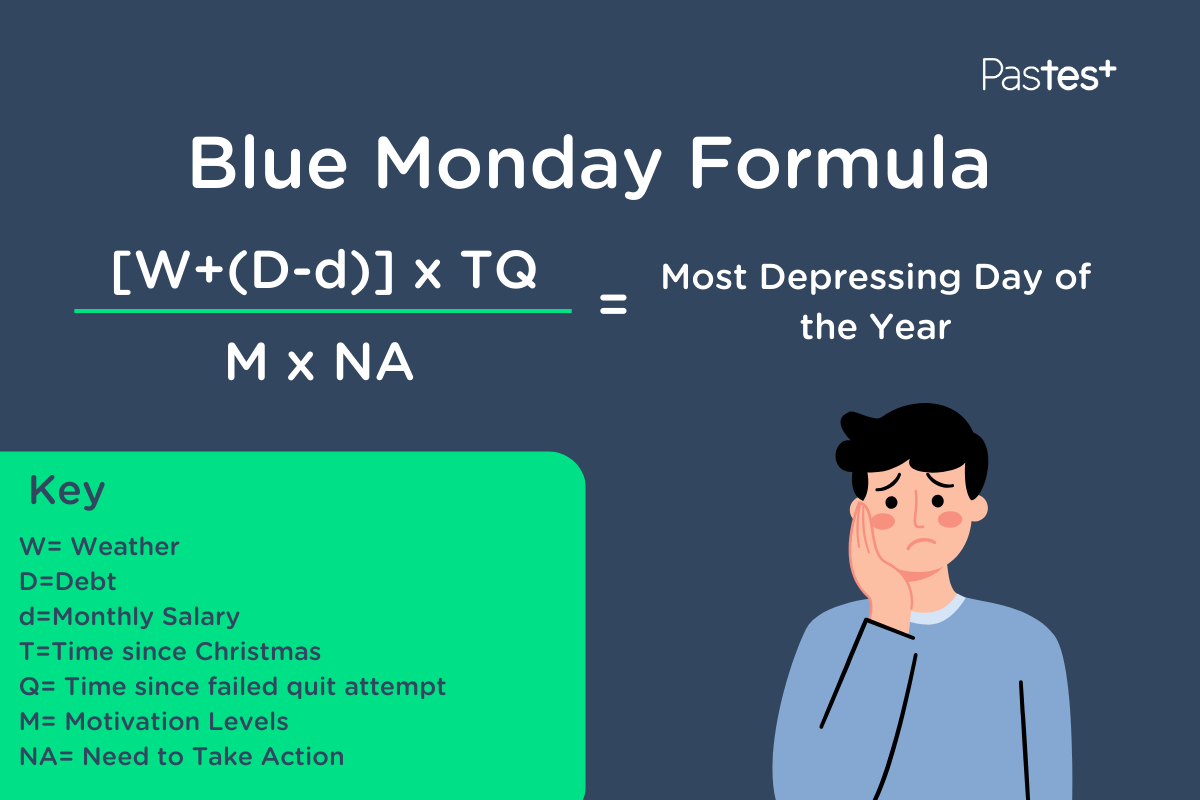
The new year is typically associated with a fresh start, setting new goals, and motivating yourself to reach new heights. The gym becomes busier, diets improve and many finally start their pesky post-Christmas revision.
However, the third Monday of January (15th January 2024) is synonymous with representing the opposite of a fresh start. Known as “Blue Monday”, this day is widely regarded as the most depressing day of the year.
Restarting revision for your medical exams is already hard following a few days off relaxing; coupling this feeling with the impact of Blue Monday makes the challenge of revising feel unthinkable, but we’re here to show you why Blue Monday may not be as damaging to your revision as you once thought…
The origins of this phenomenon began in 2004, as psychologist Dr. Cliff Arnall, created a formula in an attempt to discover the bleakest day of the year.
The formula

Although Dr Arnall did a great job at making Blue Monday seem factual, in reality, it was a marketing stunt created by Sky Travel in the hopes of selling more holidays following the festive season. Many, including Dr Arnall’s colleagues, have labelled Blue Monday as “pseudoscientific”, meaning although these beliefs are perceived as scientific, this is far from the truth. Some charities are working hard to remove the stigma attached to Blue Monday.
Since 2018, Samaritans have worked hard to promote “Brew Monday” a more positive alternative to Blue Monday, encouraging people to meet their friends and family for a “cuppa and a chat” to remove the negative connotations of the “saddest day of the year” and turn it into an opportunity for open conversations and connecting with others.
One possible explanation for the public belief in Blue Monday may come as a result of Seasonal Affective Disorder, also known as, SAD. The NHS describe SAD as a form of depression that comes and goes in a seasonal pattern, typically in the winter months although some may be affected throughout the summer.
As a result of the increased number of hospital admissions throughout the winter months alongside the increased illness and higher death rates of winter, healthcare professionals and students on their medical placements will likely be more prone to SAD than the average person. As a result, we wanted to share the symptoms of SAD so you can recognise if you may be impacted by the mental health issues associated with this concept.
Symptoms of SAD can include:
- A persistent low mood
- A loss of pleasure or interest in everyday activities
- Irritability
- Feelings of despair, guilt, and worthlessness
- Feeling lethargic (lacking in energy) and sleepy during the day
- Sleeping for longer than normal and finding it hard to get up in the morning.
- Craving carbohydrates and gaining weight
- Difficulty concentrating
- Decreased sex drive.
As the January exam diet approaches, it’s vital you consider the very real possibility of being affected by SAD. Dealing with the lack of sunlight, constant rain, and lack of money after Christmas, it can be extremely difficult to find the motivation to get stuck into your revision especially when many can’t engage with their typical techniques for improving mindfulness such as getting some much-needed vitamin D from sunlight or going on a walk.
We get it, it can be hard to get back into a routine when these negative thoughts creep in, but don’t worry, we’ve listed 4 ways you can combat SAD, improve your mental health, help you stay motivated and keep your medical revision schedule firmly on track.
4 Ways to Combat Seasonal Affective Disorder (SAD)
- Bring Nature Inside: According to a study from 2013, adding plants into your home or adding soothing pictures of picturesque landscapes can reduce the effects of acute mental stress.
- Cardio: When jogging or cycling, your body releases hormones called endorphins (sometimes known as “runners high”), that create a short-lasting, euphoric state following intense exercise.
- Socialise: As promoted by Samaritans, socialising is an excellent way of reducing the effects of depression as it shows individuals, they have a strong support circle as well as providing a reality check from negative, irrational thoughts that may be experienced.
- Re-frame your yearly goals: The new year provides a great opportunity to plan out some goals for the year. These goals can be academic, career-focused, or socially oriented. The important thing is these goals are working towards making you feel a sense of achievement or happiness!
If you need more guidance on how to prepare for your upcoming exams, whether you’re a medical student or in post-graduate studies, read our blog, 7 Ways to Clear the Mind and Regain Your Focus for more expert tips on getting back into the swing of revision whilst you prepare to head back to medical school in the coming weeks.
If you're struggling this winter, please do not hesitate to contact our partner, You Okay, Doc?, a mental health charity that supports doctors' and medical practitioners’ mental health.
Sources:
Blue Monday: Why it is the most miserable day of the year and how to beat it? | Evening Standard
What is Blue Monday - and what makes it the most depressing day of the year? | UK News | Sky News
Overview - Seasonal affective disorder (SAD) - NHS (www.nhs.uk)
- 15 Jan 2024
- Mental Health